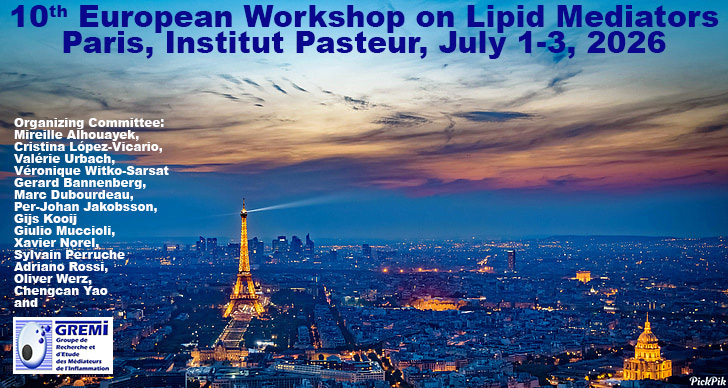Eicosanoids, SPM & Vascular Pharmacology
Human vascular tissue research
Welcome to our homepage, enjoy your visit!
Host laboratory for BA, Master and PhD Thesis, contact: xnorel@hotmail.com, INSERM U1148, Laboratory for Vascular Translational Science (LVTS). CHU X. Bichat, 46, rue Henri Huchard, 75877 Paris Cedex 18, France. Access, map. Tel: 33 1 40 25 75 29 |


Introduction Eicosanoids are metabolites of arachidonic acid derived from the action of the cyclooxygenase (cyclooxygenase pathway) or lypoxygenase enzymatic pathways. These metabolites may control the smooth muscle tone, the cell proliferation and migration in human vascular bed. Most of our present studies concern the 8 different prostanoid receptor subtypes (DP, EP1-4, FP, IP, TP) activated by prostaglandins and/or thromboxane and the enzymatic activities ( COX-1, COX-2, mPGES...) involved in the cyclooxygenase pathway. The roles of prostanoids in the human vascular wall are investigated in physiological and pathophysiological conditions (pulmonary hypertension, systemic hypertension, varicosity, atherosclerosis, aneurysm, preeclamsia). On the other hand, n-3 PUFA, like (Docosahexaenoic acid (DHA) and Eicosapentaenoic acid (EPA)) mainly found in fish oils and their metabolites (Resolvin (Rv), Protectin (PD), Maresin (MaR)), are involved in the resolution of inflammation. These specialized pro-resolving lipid mediators (SPM) have been recently reported to be protective against cardiovascular events and pulmonary inflammation. |
-
LAST PUBLICATIONS of the RESEARCH GROUP (5 last years):
Upregulation of the maresin pathway and PGE2 metabolism in the failing human left ventricle. Biochim Biophys Acta Mol Cell Biol Lipids. 2025 Jun 24;1870(6):159645. doi: 10.1016/j.bbalip.2025.159645. Online ahead of print. PMID: 40516692. PDF
Dysfunction of COX-2/mPGES-1/PGE2 pathway and EP4 receptor in bronchi from COPD patients. Prostaglandins Leukot Essent Fatty Acids. 2025 May 24;206:102685. doi: 10.1016/j.plefa.2025.102685. Online ahead of print. PMID: 40516473. PDF
The Concise Guide to PHARMACOLOGY 2023/24: G protein-coupled receptors. Br J Pharmacol. 2023 Oct;180 Suppl 2:S23-S144. doi: 10.1111/bph.16177. PMID: 38123151 Free article.
PDF
AMPK activation by metformin protects against pulmonary hypertension in rats and relaxes isolated human pulmonary artery. Eur J Pharmacol. 2023 May 5;946:175579. doi: 10.1016/j.ejphar.2023.175579. Epub 2023 Mar 11. PubMed PMID: 36914083.DHA, RvD1, RvD5, and MaR1 reduce human coronary arteries contractions induced by PGE(2). Prostaglandins Other Lipid Mediat. 2023 Apr;165:106700. doi: 10.1016/j.prostaglandins.2022.106700. Epub 2022 Dec 15. Review. PubMed PMID: 36528331.
THE CONCISE GUIDE TO PHARMACOLOGY 2021/22: G protein-coupled receptors. Br J Pharmacol. 2021 Oct;178 Suppl 1:S27-S156. doi: 10.1111/bph.15538. PMID: 34529832 Free article.
Prostaglandin Endoperoxide H Synthase-2 (PGHS-2) Variants and Risk of Obesity and Microvascular Dysfunction Among Tunisians: Relevance of rs5277 (306G/C) and rs5275 (8473T/C) Genetic Markers. Biochem Genet. 2021 Dec;59(6):1457-1486. doi: 10.1007/s10528-021-10071-w. Epub 2021 Apr 30. PubMed PMID: 33929697.
In search of pulmonary hypertension treatments: Effect of 17β-estradiol on PGI2 pathway in human pulmonary artery. Prostaglandins Leukot Essent Fatty Acids. 2021 Sep;172:102321. doi: 10.1016/j.plefa.2021.102321. Epub 2021 Aug 9. PMID: 34403986
Downregulation of PGI2 pathway in Pulmonary Hypertension Group-III patients. Prostaglandins Leukot Essent Fatty Acids. 2020 Sep;160:102158. doi: 10.1016/j.plefa.2020.102158. Epub 2020 Jul 5. PMID: 32673988

